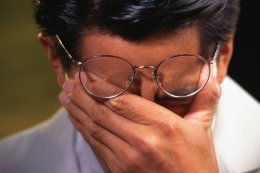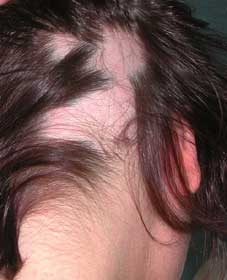| Menu
|
 |
Special
Offers
|
A
new religion for hair... |
|
|
|
|
 | CAROL'S
COLUMN |  | Views
& tips from your side of the counter........

|
|  |
Tired
gritty eyes?
Soreness and tired gritty eyes, and a constant desire to blink are common symptoms
for those who read a lot or do a lot of detailed work, and those of us whose work
involves a computer screen or hand-written work. The feeling is caused by a lack
of blinking due to concentration, tension around the muscle which moves the eyeball
and overuse of the muscle which alters the shape of the lens. If you do close
work, or work at a screen use these simple tips to help ease the eyes.
|  |
• Intermittently
raise the eyes and focus on an object in the distance for a minute or so. This
relaxes the ciliary muscle.
• Every now and then, close both eyes
and count to 60 - this will relax the eye muscle.
• Place cupped
palms over both eyes and open them. Staring into the dark for a short time alleviates
the strain from artificial lighting and computer screens.
  
BODY
ODOUR
It is a common misconception that the sweat we produce is
responsible for the unpleasant odour associated with what we call BO but, in fact,
sweat is actually odourless itself. It is only when it has lain on the skin for
some time that it develops a pungent smell - it attracts bacterial organisms,
which are responsible for the odour and are particularly attracted to the fatty
substances and proteins secreted during perspiration.
|  | An
excess growth of hair can be a cosmetic problem for women, especially when on
the face, and can be caused by hormonal disorder. Coarse, dark hair sometimes
grows on a womans face, trunk and arms just like a man. This is very often natural
and normal, though unsightly, particularly if it happens after the menopause or
in Asian or Hispanic women.
However, excessive hairiness (hirsutism)
may be a symptom if an underlying disorder, such as polychstic ovary syndrome,
or a disorder of the pituitary or adrenal gland. Such disorders upset the balance
of hormone production so there is an overproduction of the make hormone. Hirsutism
can also be the result of taking anabolic steroids.
Although this can
be a particularly upsetting condition for a woman, hormonal tests are relatively
easily done and imbalances can often be corrected. Your GP will be able to give
you support with the problem.
If however the cause is not hormonal and
is cosmetic but you feel it is still a problem, consulting a beautician will put
you on the right track as bleaching or electrolysis may be the answer. Electrolysis
can be costly and repeated treatment will be needed but it can remove the hair
on a more permanent basis. Shaving although cheap and convenient will very often
make the hair coarser and can be psychologically upsetting to women who feel a
loss of femininity.
 |
ALOPECIA
Complete loss of body hair, alopecia totalis, is rare but many
women suffer from some degree of alopecia or excessive hair loss in their lives.
Hair grows in cycles but the length of the cycle depends on the area of the body.
For instance head hair grows at a different rate than leg or pubic hair. During
pregnancy many women find the head hair grows thicker and fuller than normal but
then with the decrease of hormone levels after the birth there can be alarming
shedding of hair. This process is perfectly normal.
Alopecia areata is
an unpleasant condition, which worries sufferers. Hair falls out in small clumps
(around the size of a ten pence piece). |
Although this condition usually cures itself within about 6 months, doctors can
sometimes prescribe local injections to speed things up. Particularly if the sufferer
is distressed as additional stress can itself lead to temporary hair loss.
The most common form of alopecia is hereditary and usually affects men. The precise
cause of alopecia areata is not determined but can sometimes follow severe emotional
upset.
Alopecia following trauma or severe illness is common and will
usually cure itself within two to three months. As women age it is natural to
experience hair thinning, although many are blessed with full healthy heads of
hair into their seventies. But thinning of hair in younger women is often the
result of product damage. Repeated perming, heat damage and colouring can all
takes its toll if not properly taken care of and can cause the hair to break off,
often close to the scalp, giving the appearance of thinning hair.   
|








